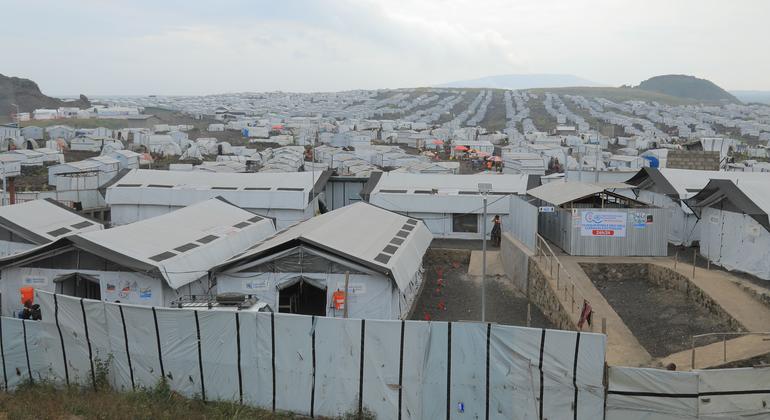In an alert on Tuesday, UN aid coordinators OCHA said that six humanitarian workers have been killed since January – the latest victim was shot during clashes last week near a hospital in Masisi Territory about 80 kilometres west of Goma, in North Kivu.
The same clashes reportedly killed three other civilians and injured a child, according to OCHA, which said that more than 100,000 people have been forced to flee their homes due to further clashes last week in Lubero Territory, 250 kilometers north of Goma.
Rape and other violations reported
Because of the insecurity several local health facilities have had to suspend activities. Humanitarian partners on the ground also report that there have been widespread human rights violations amid the fighting, including rape, OCHA said.
Meanwhile, local officials in South Kivu report schools are gradually re-opening in Kalehe Territory, located some 65 kilometres north of the provincial capital Bukavu.
Unexploded ordnance remains a problem in many areas affected by recent fighting, including two schools in the city of Minova, north of Bukavu, according to humanitarian partners.
The head of UN Peacekeeping Operations expressed concern over the humanitarian crisis and loss of life in the DRC during a press conference in South Sudan’s capital, Juba, on Monday.
Jean-Pierre Lacroix stressed that there is no military solution to the crisis and reiterated that while “it’s encouraging to see progress and involvement from stakeholders…the priority is a cessation of hostilities, implementation of decisions from the Luanda Process, and ensuring humanitarian access.”
He added that the UN Mission faces limitations in M23-controlled areas but continues to protect civilians and reduce violence in other areas, safeguarding hundreds of thousands of civilians daily.
Europe faces a ‘cradle to cane’ health crisis, warns WHO
And in a medical update on Tuesday, UN health agency WHO warned that countries across Europe and Central Asia have a major problem with “stagnating” healthcare systems.
According to the World Health Organization (WHO), almost 76,000 children in the region die before their fifth birthday every year.
In addition, non-communicable diseases claim the lives one in six people before they’re 70.
Wide regional variations
WHO’s latest European Health Report showed that under-five mortality ranged from 1.5 to 40.4 deaths per 1,000 live births across 53 countries in the region.
The top causes of death include pre-term birth complications, birth asphyxia and congenital heart anomalies.
Despite much progress in tackling non-communicable diseases across Europe and Central Asia, conditions such as heart and lung disease, stroke and diabetes remain by far the biggest killers.
At least 10 countries have achieved a 25 per cent reduction in premature mortality from these four non-communicable diseases.
Nonetheless, one in six people still die before they reach their 70th birthday from cardiovascular disease, cancer, diabetes or chronic respiratory disease, WHO said.
Chad: Nearly four million could go hungry during lean season
Humanitarians in Chad are warning about the impact of the forthcoming lean season on food security, amid already dire conditions, UN Spokesperson Stéphane Dujarric said on Tuesday.
A regional assessment found that some 2.4 million people are not getting enough to eat, which is expected to rise to 3.7 million people, or 20 per cent of the population, during the lean season from June to August.
More than two million children under the age of five are malnourished, including more than half a million who are suffering from severe acute malnutrition who are at risk of dying in the coming months without the appropriate treatment.
Additionally, nearly 300,000 pregnant and breast-feeding women are suffering from acute malnutrition.
Multiple shocks
Mr. Dujarric told journalists in New York that “this crisis is due to shocks, including natural catastrophes such as floods, which have destroyed croplands, in addition to the increasing price of basic commodities.”
Humanitarians warn that unless significant funding is received before the end of March, there will be no time to prevent a full-scale food security and nutrition crisis.
They are appealing for $1.45 billion to support operations in Chad this year but have so far received under $60 million, roughly four per cent.



